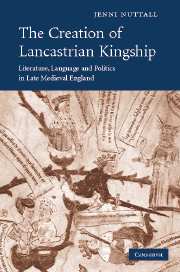Book contents
- Frontmatter
- Contents
- Acknowledgements
- Note on quotations and references
- Note on editions
- Abbreviations
- Introduction
- PART I HOUSEHOLD NARRATIVES
- 1 Stereotyping Richard and the Ricardian familia
- 2 The dissemination of the Ricardian stereotype
- 3 Politicizing pre-existing languages
- 4 From stereotypes to standards
- 5 Household narratives in Lancastrian poetry
- PART II CREDIT AND LOVE
- Conclusion: Lancastrian conversations
- Notes
- Bibliography
- Index
- CAMBRIDGE STUDIES IN MEDIEVAL LITERATURE
5 - Household narratives in Lancastrian poetry
Published online by Cambridge University Press: 27 October 2009
- Frontmatter
- Contents
- Acknowledgements
- Note on quotations and references
- Note on editions
- Abbreviations
- Introduction
- PART I HOUSEHOLD NARRATIVES
- 1 Stereotyping Richard and the Ricardian familia
- 2 The dissemination of the Ricardian stereotype
- 3 Politicizing pre-existing languages
- 4 From stereotypes to standards
- 5 Household narratives in Lancastrian poetry
- PART II CREDIT AND LOVE
- Conclusion: Lancastrian conversations
- Notes
- Bibliography
- Index
- CAMBRIDGE STUDIES IN MEDIEVAL LITERATURE
Summary
Responses to the language made memorable by the deposition changed as Henry moved from usurper-reformer to an established monarch whose own governance was discussed and debated. The Mum-poet extended depositional rhetoric in a manner supportive of the Lancastrian usurpation in Richard but, in his later poem, these politicized paradigms appeared in a form far outside of Lancastrian control. Despite the Mum-poet's claim to be seeking out a truthteller for the familia regis, his anonymity and his pro-Lollard views suggest that any direct communication between him and the Lancastrian court was more imaginary than actual. Yet authors such as Hoccleve, Gower and Scogan, in poems written for and within the Lancastrian affinity, also responded creatively to depositional rhetoric. These authors addressed poems directly to Henry IV, his sons and members of his government or household. Yet despite this close contact, their poems are not pieces of subordinated propaganda, repeating willingly or involuntarily the paradigms and rhetoric which had been used to justify the deposition. Neither do they avoid depositional rhetoric in favour of neutral and impartial language. Instead, they adopt a third position, closer than one might think to that of the author of Richard and Mum, in which recently politicized elements reoccur in different forms, with different targets or with different emphases. They exploit the capacity of political language to be multiple in both time and referent, able simultaneously to revive moments of past importance, to describe current difficulties and to shape future responses.
- Type
- Chapter
- Information
- The Creation of Lancastrian KingshipLiterature, Language and Politics in Late Medieval England, pp. 55 - 72Publisher: Cambridge University PressPrint publication year: 2007



